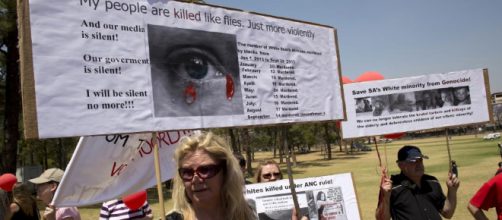I read the story of a protest that took place in South Africa last week, it was called the Black Monday March and it was being held in relation to the rise in murders of South African farmers. I have a personal reason to report on this story, as I have relatives that live in South Africa. I was told a story by my father about his brother's wife's father being shot and injured some years back in a farm robbery. Having been to South Africa many times in my life and being familiar with the nation's problem with crime I just presumed it to be an isolated incident.
So when I heard the story of this protest that was taking place in response to this type of incident, I felt it necessary to investigate it more.
Farm murders at highest level since 2010-2011
The figures I found in relation to this story are shocking. South Africa, a nation with roughly fifty-five million inhabitants has one of the highest crime rates in the world.
On average, 18,000 people are murdered in South Africa every year, or the equivalent to 34 people per 100,000 of the population. Between 1990 and 2012 there had been an estimated 1,544 murders on South African farms, of which 208 of the victims were Black South Africans. This data was compiled by the Transvaal Agricultural Union.
Since 2010-2011, there has been a noticeable rise in the number of farmers being murdered in South Africa.
South Africa's Police Service (SAPS) reports there have been a total of 74 farmers murdered between April 2016 and March 2017 - up from 58 people from the year previously. According to the Transvaal Agricultural Union, there were 64 murders of farmers in 2015, 71 in 2016 and in the first nine months of 2017 there have already been 68 murders. These figures indicate that a farmer in South Africa is four and a half times more likely to be murdered than any other South African, leading some to call it the most dangerous job in the world.
Apartheid has left a great stain
South Africa's history is long, bloody and contentious. The racial system of Apartheid has left a great stain on the psyche of this beautiful land and many Black South African's can vividly remember in their lifetime what it was like to be an oppressed majority in their own land.
There have been some aspersions made as to what the motive for these crimes may be: some claim the motive is simply robbery. South Africa is a nation that still has issues regarding dire poverty and robbery could possibly be a reasonable motive to suggest.
There is, however, another motive. In 1913, The Natives Land Act was passed, which awarded 87 percent of the land to Europeans. Since the end of Apartheid, the next generations of young Black South Africans have been voicing their discontent at the continued ownership of this land by white South Africans. The Economic Freedom Fighters, headed by firebrand politician Julius Malema has demanded there be a re-distribution of land and wealth in the country.
There have also been some activist groups in South Africa that have called for brutal tactics to displace the white farming community, in their words to send them the message to "get out of the country."
Johan Burger of the Institute for Security Studies stated the motives for the robberies is greed, and race does not play a significant factor. But on the Black Monday March, many white South African's, or Afrikaners as they are better known, held the belief that this is a racially motivated purge, similar to the one undertaken by Robert Mugabe in Zimbabwe. The motives for these murders remain in dispute, but it is hard not to find a racial connotation present in some of these crimes. There have also been some shocking crimes which have been committed by farmers on their black workers which have also added to the flames of tension and resentment.
A genuine grievance
The issue of race in South Africa is a scar that will take generations to heal. The horrors and terror inflicted upon black South Africans at the hands of the tyrannical Apartheid regime is still a wound and a genuine grievance many black South Africans still hold. I am inclined to say that I completely understand that. But back in the 90's when Mandela was on his rise to power, what defined Nelson Mandela as of one of the greatest men of the 20th Century was his ability to look past his own personal grievance and hurt and try to unify the nation beyond the issue of race, under the banner of a reborn "Rainbow nation." I am sad to say the work of that great man seems to be coming undone.
I completely understand the hurt and resentment of black South Africans, but if race is the motive for these crimes, it will only serve to add to a legacy of bloodshed and hurt. Nobody should be murdered over their race, black or white. The lessons of recent history tell us this move could only serve to weaken a nation which has been struggling with its own economic problems. The murders of farmers in South Africa is not a topic that has been afforded a lot of press coverage, but if these figures continue to rise, maybe we might have to take the bold step and refer to this rather than an isolated string of murders, and start to call it a "possible genocide."


